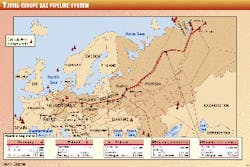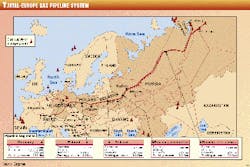Gazprom frets over gas prices amid expansion
Faced with the need to make unprecedented capital outlays to finance a major expansion of Russia's gas production and transportation industry, state-owned natural gas giant Gazprom is concerned about European natural gas prices.
Former Gazprom Chairman Rem Vyakhirev went so far as to call for the formation of an organization of gas exporting countries capable of regulating the price of natural gas. He told executives at the Fourth Executives Gas Summit in Paris in early October that the time has come to set up such a group because of the growing share of natural gas in the European energy market, now about 27%.
Linking natural gas prices to those of other fuels no longer makes sense, he says, and the recent drop in oil prices had greatly affected gas exporters.
"When the price of natural gas involved in international trade falls, the economic efficiency of gas exports falls accordingly," said Vyakhirev. "The export price of Russian gas delivered to the border is now at an extremely low level."
In addition, Vyakhirev fears that the deregulation of Europe's gas market will generate strong competition and that consequent growth in gas sales via the use of short-term contracts and spot transactions will bring down both wholesale and retail gas prices.
Gazprom is already suffering from the inability of its customers (namely, transit country Ukraine) to pay for gas deliveries and from a lack of capital needed to develop new gas fields and construct new export pipelines, he says.
He believes that, very soon, "The imbalance between the capacities of exporters to invest and ever-growing demand could spark a real energy crisis."
Vyakhirev warns that Gazprom is not planning to keep increasing its gas supplies to Europe beyond the contracts already signed. Moreover, he insists that, during a time of investment deficits, it makes increasing sense to refuse to extend existing contracts. This is particularly true because Russia's gas demand is increasing, mainly for production of chemicals and fertilizers.
Vyakhirev was replaced earlier this year by former Prime Minister Viktor Chernomyrdin, who was Gazprom chairman until March 1998 (OGJ, Aug. 9, 1999, p. 23).
Pipeline projects
Gazprom is diversifying its transport network in an effort to change the fact that 90% of its gas exports transit Ukraine. Besides the Yamal-Europe pipeline (see story, this page)-which will begin transmitting Russian gas to Germany near Frankfurt-an-der-Oder this month, integrating Gazprom's system with the European gas grid-Germany's Jagal North pipeline (between Frankfurt-an-der-Oder and R
Both the Jagal and Wedal systems are owned by Wingas, a joint venture of Germany's Wintershall AG (65%) and Gazprom (35%).
Vyakhirev is also optimistic about progress being made on the Blue Stream project, which will export Russian gas across the Black Sea to Turkey (OGJ, July 26, 1999, p. 44). The pipeline will be laid in water as deep as 2,200 m-about three times the current depth record for gas pipelines, according to Vyakhirev.
At the Paris gas summit, Salvatore Russo, chairman and CEO of Italian gas transportation firm Snam, confirmed that financing for Blue Stream has been completed. Snam is working on the project with Gazprom and is in charge of construction of the subsea portion under a turnkey contract.
A trans-Balkan gas pipeline is also under study, says Vyakhirev. A Gaz- prom-Neste Oy joint venture was set up and has completed a feasibility study for the North European gas line, with a number of routes being examined (see map, this page). He also said Gazprom has in its plans another South European gas pipeline that would supply excess Russian gas to Europe's southwestern and southern markets.
Russia's "huge gas potential" could also be used to supply the Asia-Pacific region, Vyakhirev pointed out. A number of projects are being studied, he says. Last year, a gas cooperation agreement was signed between China National Petroleum Corp. and Gaz- prom, establishing a "concept for the supply of Russian natural gas to China's eastern regions."
The most promising of Gazprom's potential Asian export projects is construction of a 6,500-km gas pipeline from Western Siberia to China. The gas is to come from Bolchekhetskaya field in the Yamalo-Nenets autonomous region near Tyumen.
Another project Gazprom may participate in involves supplying Irkutsk basin gas to China and South Korea from a field in Eastern Siberia.
Field developments
Most of Gazprom's existing export contracts are supplied by mature gas fields that are nearly depleted, such as Orengoi, Yamburg, Medvegie, and Orenburg. Vyakhirev says new fields in these areas, including Zapoliarnoye and Pestsovoye, will have to be brought on stream to maintain production levels.
Gazprom plans to begin developing fields in the Ob-Taz Bay region and Gydan in Western Siberia, as well as fields on the Yamal Peninsula, such as Bovanenskoye, Kharasavei, and Krouzenstern.
In the longer term, there is a need to develop resources on Russia's arctic continental shelf.
Russia's united gas supply system (ESG) includes 69 producing gas-condensate fields, 148,000 km of pipeline, 249 compressor stations, 21 underground storage facilities, and 6 gas processing plants. It is adequate to supply current domestic and export demand.
Through 2005, in parallel with revamping the ESG system, Gazprom plans to develop a gas transport system in the Nadym-Pour-Taz region. In the future, as the Stokman gas-condensate field and those of the Yamal Peninsula are developed, additional transport systems will be needed.
All these projects, located in remote, hostile areas, will require heavy investment.

